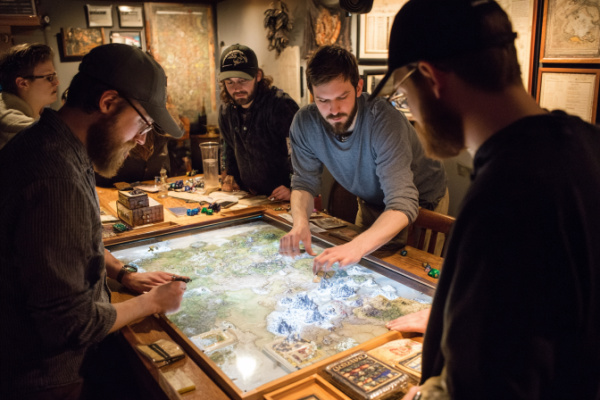Question
Gramps,
I sometimes play tabletop games like Dungeons & Dragons, and I know there are competing views on the game. I know there are LDS D&D authors and members who play, but I want to be confident that the Spirit is always with me. Am I overthinking the issue, or is it an unworthy hobby?
Anthony
Answer
Anthony,
One of the most significant benefits of playing Dungeons and Dragons is the opportunity to develop essential communication and leadership skills. As players take on the roles of characters in a shared narrative, they must articulate their thoughts, negotiate with others, and make decisions that affect the entire group. This collaborative environment fosters an atmosphere where players learn to express themselves clearly and confidently.
For instance, when a player takes on the role of the Dungeon Master (DM), they are responsible for guiding the story, managing the game mechanics, and ensuring that all players are engaged. This role requires strong leadership skills, as the DM must balance the needs and desires of various players while maintaining the integrity of the game. The experience gained in this role can translate to real-life situations, such as leading a team at work or presenting in front of a group at church.
Dungeons and Dragons is a game that thrives on problem-solving and critical thinking. Players are often faced with complex challenges that require creative solutions. Whether it’s devising a strategy to defeat a formidable foe or navigating a moral dilemma, D&D encourages players to think outside the box and consider multiple perspectives.
This emphasis on problem-solving can be particularly beneficial in professional settings. The skills honed during gameplay—such as analyzing situations, weighing options, and making informed decisions—are invaluable in the workplace. Moreover, these skills can also enhance our ability to navigate personal challenges, making us more resilient and adaptable in the face of adversity.
Another often-overlooked aspect of Dungeons and Dragons is the importance of time management. Players must balance their characters’ actions within the constraints of the game, often working against a ticking clock during critical moments. This experience can help players develop a better understanding of how to prioritize tasks and manage their time effectively.
In a world where distractions abound, the ability to focus and manage time is crucial. The skills learned through D&D can help individuals become more productive in their personal and professional lives, allowing them to achieve their goals more efficiently.
In today’s fast-paced world, finding time to connect with friends can be challenging. Dungeons and Dragons provides a unique opportunity for individuals to gather in a relaxed environment, free from the pressures of daily life. The game encourages open communication and collaboration, allowing players to bond over shared experiences and challenges.
As players embark on epic quests together, they create memories that strengthen their friendships. The shared triumphs and defeats foster a sense of camaraderie that can be hard to replicate in other social settings. This safe space allows individuals to express themselves authentically, leading to deeper connections and a greater sense of belonging.
Dungeons and Dragons also promotes empathy and understanding among players. As individuals step into the shoes of their characters, they are often faced with moral dilemmas and difficult choices. This experience encourages players to consider the perspectives of others, fostering a greater understanding of diverse viewpoints.
In a world that can sometimes feel divided, the lessons learned through D&D can help bridge gaps between individuals. By encouraging players to empathize with their characters and fellow players, the game cultivates a culture of compassion and understanding that can extend beyond the gaming table.
As players gather to play, they can also engage in meaningful discussions about faith, values, and personal growth. This shared experience can help strengthen the bonds within the community, creating a supportive network that encourages individuals to uplift one another in their spiritual pursuits.
While some may view Dungeons and Dragons as mere escapism, the game can also serve as a powerful reminder of spiritual truths. Many fantasy stories, including those found in D&D, contain themes of sacrifice, redemption, and the struggle between good and evil. These narratives can resonate deeply with players, prompting them to reflect on their own beliefs and values.
For instance, the character development and moral choices faced by players can mirror the challenges individuals encounter in their spiritual lives. As players navigate their characters’ journeys, they may find themselves contemplating their own paths and the lessons they can learn from their experiences.
Dungeons and Dragons can also serve as a catalyst for personal reflection and growth. The game encourages players to explore their motivations, fears, and desires through their characters. This introspective process can lead to greater self-awareness and a deeper understanding of one’s spiritual journey.
As players confront challenges and make decisions in the game, they may find parallels in their own lives. This reflection can inspire individuals to seek personal growth and strive to align their actions with their spiritual beliefs.
Finally, Dungeons and Dragons can help strengthen faith by fostering a sense of community among players. For members of The Church, gathering to play D&D can create opportunities for meaningful discussions about faith and spirituality. These conversations can reinforce shared beliefs and encourage individuals to support one another in their spiritual journeys.
By engaging in a shared experience that promotes collaboration and understanding, players can deepen their connections with one another and strengthen their faith in the process.
The downside that I’ve seen personally to some who play D&D is becoming so obsessed with their characters and the game itself that it overtakes their own real lives. The key is for individuals to exercise personal judgment and choose to play in a way that aligns with their values and standards.
Gramps
Related articles:
3 Ways Dungeons and Dragons Brings You Closer to God (Yes, for Real)
Video Games, Board Games, and Gaming Culture for Mormons







